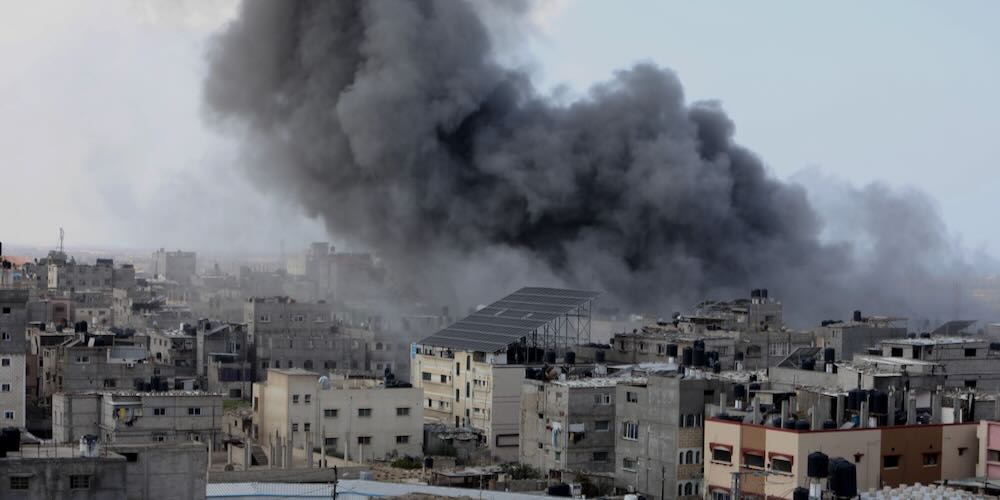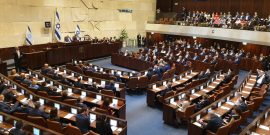The Road to Palestine
The events of October 7th marked a devastating and bloody new low in the recent history of the Israeli-Palestinian civil conflict. But this is not a new story. It is one that is at least a century old, predating current actors and their specific atrocities. The fight for Palestine has been imbued with a bloody history with both secular and religious ideologies clashing at every turn. Regardless of which was ascendant at a given time, violence seemingly has always been a part of the fight for Palestine on both sides.
But the question of a two-state solution, which was floated by the UN in the 1947 partition plan has never gone away. It has oftentimes been written and spoken about as the preferred solution, perhaps because the alternatives—a greater Israel or the destruction of Israel—have been deemed either unworkable or too horrible to comprehend. The two-state solution is put forward as a way to counter all grievances: Israel would have a sovereign state and so would the Palestinians, who are currently formally dispossessed. In theory, this would bring balance, justice, and peace to what is an otherwise intractable conflict.
Yet today, the two-state solution looks farther away than ever before as the days of the Oslo Accords recede into more distant memory. Given the current state of animosities between the two peoples, it seems quixotic to go back in time to the 1990s, and perhaps even solipsistic. Reaching back to the days when a settlement looked possible fails to account for events that have changed since then, perhaps irrevocably altering this conflict. But this does not mean there are no lessons to be learned from Oslo.
The Oslo Accords foundered in part because both parties prioritised ego, domestic politics, and the inability to move beyond the dynamics of conflict. Israel was appropriating land that the Palestinians believed was theirs by right, and the Palestinian leadership either did not or could not stop terrorist attacks from the areas they did hold onto. These are still the fights both parties are having today, which have been the backdrop of the conflict since its very inception. While we may talk of a two-state solution being the cure to this question, does it genuinely offer a realistic hope for a long-term solution?
Israel is the region’s one country that can credibly claim to be a democracy. The failure to address the Palestinian question in an equitable manner has and continues to drain their moral legitimacy.
The hope has been that the establishment of a Palestinian state would end the wave of terror. The political situation would box terror groups such as Hamas in, providing a new level of security for Israel and justice for the Palestinians following the Nakba. Creating a Palestinian state would drain away the pus from the abscess of Palestinian humiliation and alienation, creating a new era of peace and security. This is the course that Michael Walzer, the famous just war ethicist, supports. Destroy Hamas and engage in peace talks with responsible actors who are willing to talk. Negotiate and find a new way to live alongside each other with verifiable borders on each side.
But this presumes the terror groups can be destroyed, and that an independent Palestine can be trusted to maintain such a peace. I am less convinced that such an action is likely to occur, for a couple of reasons. First, the idea that Hamas can be destroyed is mistaking them for a legitimate standing army, as opposed to a revolutionary force willing to do anything it takes to achieve its goals. Those goals, established in their charters in 1988 and 2017, may have shifted tactically but they still make for disturbing reading for anyone desiring a two-state solution.
Second, in a region largely devoid of democratic elections and civil rights, a free Palestine is not going to be the land of milk and honey that some imagine. It will continue to suffer from poverty and political instability; the rights that its Western supporters demand for citizens will likely not be met. The suffering—and all that comes with it—shall merely continue with a new label, leaving plenty of room for terrorist actors to operate and even grow. This is not to suggest that we should not support a Palestinian state, or recognize how it creates the political space and rights that we in the West would demand of ourselves. Still, how likely is it to really occur?
The two-state solution asks Israel to trust that a Palestinian state won’t simply become a terrorist hotbed on their border with all the legitimacy of a nation-state. It also asks them to trust that once a Palestinian state has been marked out those borders will be kept intact. Previous attempts by Arab States to attack Israel will naturally linger when discussing these most important questions. These recent attacks make such a conversation even harder to have.
Within such a state, there will be plenty of chances for nefarious actors to grow. The West will be blamed for poverty, political instability, and the fact that a “free Palestine” will not get the territory they may well desire. Although respectable writers, such as Peter Beinart, have argued that both sides need to come together and express solidarity with each other, how can this really be achieved on a large scale? Both the occupied and the occupiers require security, dignity, and honesty with each other about what that really looks like.
This problem has convinced some who have worked on the two-state solution, such as Jason Greenblatt, that the chances of this are now dead. Indeed, those on the left who have justified and apologised for Palestinian acts of terror as a method of resistance are not helping bring about peace but merely aiding in the prolonging of conflict. David Polansky’s wide-ranging vivid essay on the question of Palestinian statehood rightly makes the point that as long as Israel makes the calculus that the pain of denying Palestinian statehood is less than acceding to Palestinian demands, then they will keep fighting to deny it.
Paradoxically this calculus does not mean ramping up the violent Palestinian resistance as some may assume. It means the Palestinian resistance distancing themselves from the horrendous atrocities against innocent men, women, and children. The attack of October 7th has ignited an emotional bonfire amongst Israeli Jews who feel threatened but determined to secure the sovereignty and safety of their homeland. The Palestinians need to make clear that Hamas is not Palestine and Palestine is not Hamas; otherwise, the prospects for any state in the near future will become not just bleak but non-existent.
It also requires Israel and her allies to address the questions of their global standing. Israel is the region’s one country that can credibly claim to be a democracy. The failure to address the Palestinian question in an equitable manner has and continues to drain their moral legitimacy. The United States and others should focus their efforts not on a vain and ultimately futile attempt to destroy a terrorist organisation, but rather on a genuine attempt to build peace. Even small gestures could potentially win credibility and political capital for a country that has been the subject of such a brutal attack.
Stubbornness, pride, and overreaction have created the conditions of instability and mutual distrust, stifling any realistic hope of a long-term solution.
The emotional bonfire is not just in Israel and Palestine but has spread across the world. As Shadi Hamid has written, if those not in the heat of battle can’t summon the courage to practise their principles without sinking to denouncing teenagers, it is hard to know what to expect of those who are in the heat of battle. War produces chaos, despair, and insecurity but it should not deprive us of our basic humanity. For too long, those on the left, and some supporters of Palestinian statehood, have justified and apologised for acts of unspeakable terrorism. Under the guise of occupation and power dynamics, the targeting of innocents has been tolerated if not celebrated. But this is not only true of those who support the Palestinian cause but also those on the right who generally stand side by side with Israel.
The results of such apologias on both sides have created a scenario where all actors have lost credibility. Palestinians have been labelled as supporters of terror and Israel is being accused of ethnic cleansing. The two-state solution seems further away than ever before but it still remains closer than the tolerable alternatives. To build back the goodwill Israel once enjoyed, it would be prudent—in time—for Israel not only to cease the terror bombing but also to begin a genuine dialogue to create a two-state solution.
The tragedy of this conflict is that both groups in the conflict are victims of historic oppression. Edward Said described the Palestinians as “victims of victims,” simultaneously an accurate and heartbreaking phrase. It describes the horror that we should all feel when witnessing this conflict. Christopher Hitchens’ tribute to the man tells us of the tragedy of the Palestinian people and their inability to secure a homeland and a just peace. The intensity of the conflict and the oppression that Palestinians have faced have made it all the less likely that a peaceful solution can be found for both parties.
This conflict is the result of both parties mutually failing one another, themselves, and their citizens. Both groups have committed criminal acts of murder, targeting civilians and showing egregiously bad political judgment. Stubbornness, pride, and overreaction have created the conditions of instability and mutual distrust, stifling any realistic hope of a long-term solution. There will be more discrimination, more emotional hurt, more protests, and more murder. The genuine chance of a two-state solution feels farther away than ever before and it shall remain that way until the fundamental conditions change.



